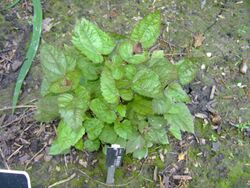Biology:Ageratina luciae-brauniae
| Ageratina luciae-brauniae | |
|---|---|

| |
| Scientific classification | |
| Kingdom: | Plantae |
| Clade: | Tracheophytes |
| Clade: | Angiosperms |
| Clade: | Eudicots |
| Clade: | Asterids |
| Order: | Asterales |
| Family: | Asteraceae |
| Genus: | Ageratina |
| Species: | A. luciae-brauniae
|
| Binomial name | |
| Ageratina luciae-brauniae (Fernald) R.M.King & H.Rob.
| |
| Synonyms[2][3] | |
| |
Ageratina luciae-brauniae is a species of flowering plant in the family Asteraceae known by the common names Lucy Braun's snakeroot and rockhouse white snakeroot. It is native to the eastern United States , where it is limited to the Cumberland Plateau of Kentucky and Tennessee .[1][4] It may also occur in South Carolina but these reports are unconfirmed.[5]
This perennial herb grows 30 to 60 centimeters tall. It has oppositely arranged leaves with thin oval or somewhat triangular blades up to 8 centimeters long by 9 wide. The inflorescence is a cluster of flower heads containing white disc florets and no ray florets.[6]
This plant grows in rockhouses, sandy spaces under overhangs of sandstone rock. It grows in moist places where water drips off the rock above.[1]
There are about 40[1] to 50[5] occurrences of the plant. Some populations in Kentucky are large but many are composed of just a few plants.[1]
Etymology
Ageratina is derived from Greek meaning 'un-aging', in reference to the flowers keeping their color for a long time. This name was used by Dioscorides for a number of different plants.[7]
This species was initially described in 1940 by American botanist Dr. Emma Lucy Braun, using the name Eupatorium deltoides.[8] This name turned out to have been used three times before,[3] so it needed to be replaced with a new name. Merritt Lyndon Fernald dubbed it Eupatorium luciae-brauniae after Dr. Braun (1889-1971).[9]
See also
- Emma Lucy Braun
References
- ↑ Jump up to: 1.0 1.1 1.2 1.3 1.4 Ageratina luciae-brauniae. The Nature Conservancy.
- ↑ "Ageratina luciae-brauniae (Fernald) R.M.King & H.Rob.". The Global Compositae Checklist (GCC). http://www.theplantlist.org/tpl1.1/record/gcc-83432.
- ↑ Jump up to: 3.0 3.1 The International Plant Names Index search for Eupatorium deltoideum
- ↑ "Ageratina luciae-brauniae", County-level distribution map from the North American Plant Atlas (NAPA) (Biota of North America Program (BONAP)), 2014, http://bonap.net/MapGallery/County/Ageratina%20luciae-brauniae.png
- ↑ Jump up to: 5.0 5.1 Ageratina luciae-brauniae. Center for Plant Conservation.
- ↑ Nesom, Guy L. (2006), "Ageratina luciae-brauniae", in Flora of North America Editorial Committee, Flora of North America North of Mexico (FNA), 21, New York and Oxford, http://www.efloras.org/florataxon.aspx?flora_id=1&taxon_id=250066018
- ↑ Gledhill, David (2008). "The Names of Plants". Cambridge University Press. ISBN:9780521866453 (hardback), ISBN:9780521685535 (paperback). pp 39
- ↑ Braun, Emma Lucy 1940. Rhodora 42(494): 50–51 description in Latin, commentary in English
- ↑ Fernald, Merritt Lyndon 1942. Rhodora 44(528): 463
External links
Wikidata ☰ Q4692126 entry
 |


